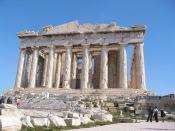Greek mythology and Roman mythology are almost identical. This is an accepted fact, as it is widely known that the Romans stole the Greek myths. However, it is very interesting to note that the mythology of the Vikings (Norse) has many similarities with the Greek myths. These myths are, by no means, identical to the Greek ones (like the Roman ones are), but there are very distinct commonalities between the two. I see two possible reasons for this besides pure coincidence.
The first has to do with the fact that Norse myths were codified during the Viking era: 780 - 1070. This gives the Norsemen many centuries to become exposed to the Greek (or Roman) myths. The Vikings did travel as far east as the Caspian sea, which is further east than both Italy and Greece. The Norse myths were fashioned after the fall of the Roman empire.
During the expansion of the Roman empire, the Romans were able to get all the way to Britain, which is farther west than the Scandinavian countries where these myths originated. The Vikings made many expeditions into Britain. So it is a very realistic thought that the Vikings could have been exposed to the stories of the Greek and Roman gods. It is also possible that the Vikings could have extrapolated parts of the Roman stories into their own. The only two existing primary sources of Norse mythology are the Prose (Elder) Edda, and the Poetic (Younger) Edda. These were written about one thousand to eight hundred years ago respectively.
The second factor has to do with mythology as an extension of the society that fashions it. I see mythology as an attempt by a people to explain the powerful forces which affect and shape it, that are beyond its control,


